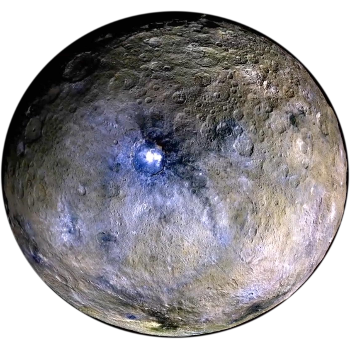
Ceres
Friday, July 18, 2025
Ceres was the first object discovered in the asteroid belt. Sicilian astronomer Father Giuseppe Piazzi spotted the object in 1801. Piazzi was looking for suspected planets in the large gap between the orbits of Mars and Jupiter. As more such objects were found in the same region, they became known as asteroids or minor planets. Ceres was initially classified as a planet and later classified as an asteroid. In recognition of its planet-like qualities, Ceres was designated a dwarf planet in 2006 along with Pluto and Eris. -[NASA]
Changing Data
- Rises:
- Sets:
- Apparent Magnitude:
- Illumination:
- %
- Size (")
- Distance in light minutes:
- Distance in miles:
- 0
- Distance in AU:
Orbital Data
- Rotational Period:
- 0.378
- Orbital Period:
- 4.60
- Perihelion:
- 3.810 * 108 km
- Aphelion:
- 4.464 * 108 km
- Epoch:
- 2011.08.27
- Inclination:
- 10.59°
- Semi-Major Axis:
- 4.137 * 108 km
- Orbit Circumference:
- 2.595 * 109 km
- Eccentricity:
- 0.079138251
- Ascending Node:
- 80.37910°
- Axial Tilt:
- °
- Albedo:
- Color BV:
- Color UV:
- Equatorial Diameter:
- 9.520 * 102 km
- Equatorial Circumference:
- 2.992 * 103 km
- Surface Area:
- 2.850 * 106 km2
- Surface Gravity:
- 0.28 m/s2
- Surface Temperature:
- Mass:
- 9.470 * 1020 kg
- Volume:
- 4.52331 * 108 km3
- Density:
- 2.09 g/cm3
- Absolute Magnitude:
- 3.34
